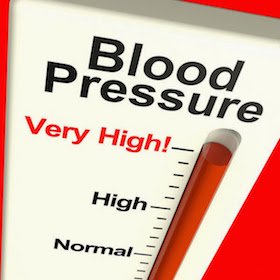Hypertension, the medical term for high blood pressure, is a common condition when the blood vessels have persistently raised pressure. The vessels carry blood from the heart to all parts of the human body. Blood is pumped into the vessels every time the heartbeats. Blood pressure is created by the force of blood pushing against the walls of the blood vessels (arteries). To put it simply, the more blood your heart pumps and the narrower your arteries, the higher your blood pressure.

Blood pressure is determined by two numbers. The higher number (systolic pressure) is the strength at which your heart pumps blood all over your body, while the lower number (diastolic pressure) is the resistance to the blood flow in the blood vessels. Both of the pressure is measured in millimeters of mercury (mmHg). The following is a general guide of blood pressure by the NHS:
- Between 90/60mmHg and 120/8-mmHg are considered as the ideal blood pressure.
- Between 140/90mmHg or higher (or 150/90mmHg or higher for anyone over 80 years old) are considered as high blood pressure.
- Between 120/80mmHg and 140/90 usually means a person is at risk of developing high blood pressure.
Blood pressure usually does not have a symptom, even when it reaches a severely high level. You can have hypertension for a long time without experiencing any symptoms. Some people may experience shortness of breath, headache, or nosebleeds, but the signs are not specific and obvious. They usually occur when the blood pressure has reached a life-threatening stage. However, you can easily detect high blood pressure. The blood pressure reading is usually a part of the routine in many doctor’s appointments. You can ask your doctor for a blood pressure reading at least every two years, but if you do not see your doctor regularly, you can get blood pressure readings done in many Pharmacies.
Hypertension, when not managed well, can lead to heart attack, stroke, and many other problems. It affects anyone at any age, including children and teenagers. The cause is often unknown and one of the most common causes is chronic kidney disease (CKD), and there are several cases where it’s caused by an underlying condition or medication. Although the cause is not always clear, certain things can increase your risk, including:
- Size- Overweight or obesity is one of the key risk factors
- Age- People over the age of 60 since the arteries can become stiffer and narrower due to plaque, particularly at old age
- Ethnicity- Some ethnic groups (African and Caribbean descent) are more likely to have high blood pressure
- Family history- Having a relative with high blood pressure can increase your risk
- Unhealthy diet- You like to eat too much salt, and you do not eat enough fruit and vegetables. Your blood pressure will also be high if your diet is low in potassium
- Physical inactivity
- Alcohol, Tobacco, and Coffee.
Having high blood pressure for a short time is normal, especially after intense exercise or acute stress. But long-term hypertension can cause many complications because the build-up of plaque can result in the narrowing of your blood vessels. Narrowing blood vessels force the heart to pump harder to deliver blood to the body, which makes hypertension worse. Hypertension can lead to heart failure, aneurysm, kidney failure, stroke, amputation, and blindness. Therefore, regular blood pressure screening is vital to help people avoid severe complications.
There are steps you can take to prevent or lower high blood pressure. The most important step is lifestyle changes, you can reduce the amount of salt you eat, have more fruit and vegetables in your diet, stop smoking, exercise regularly, and cut down caffeine, alcohol, and tobacco. When you are diagnosed with hypertension, doctors may recommend taking 1 or more medicines to keep your blood pressure under control. The medicines normally start one at a time at a low dose, but eventually, a combination of at least two medicines is required.

